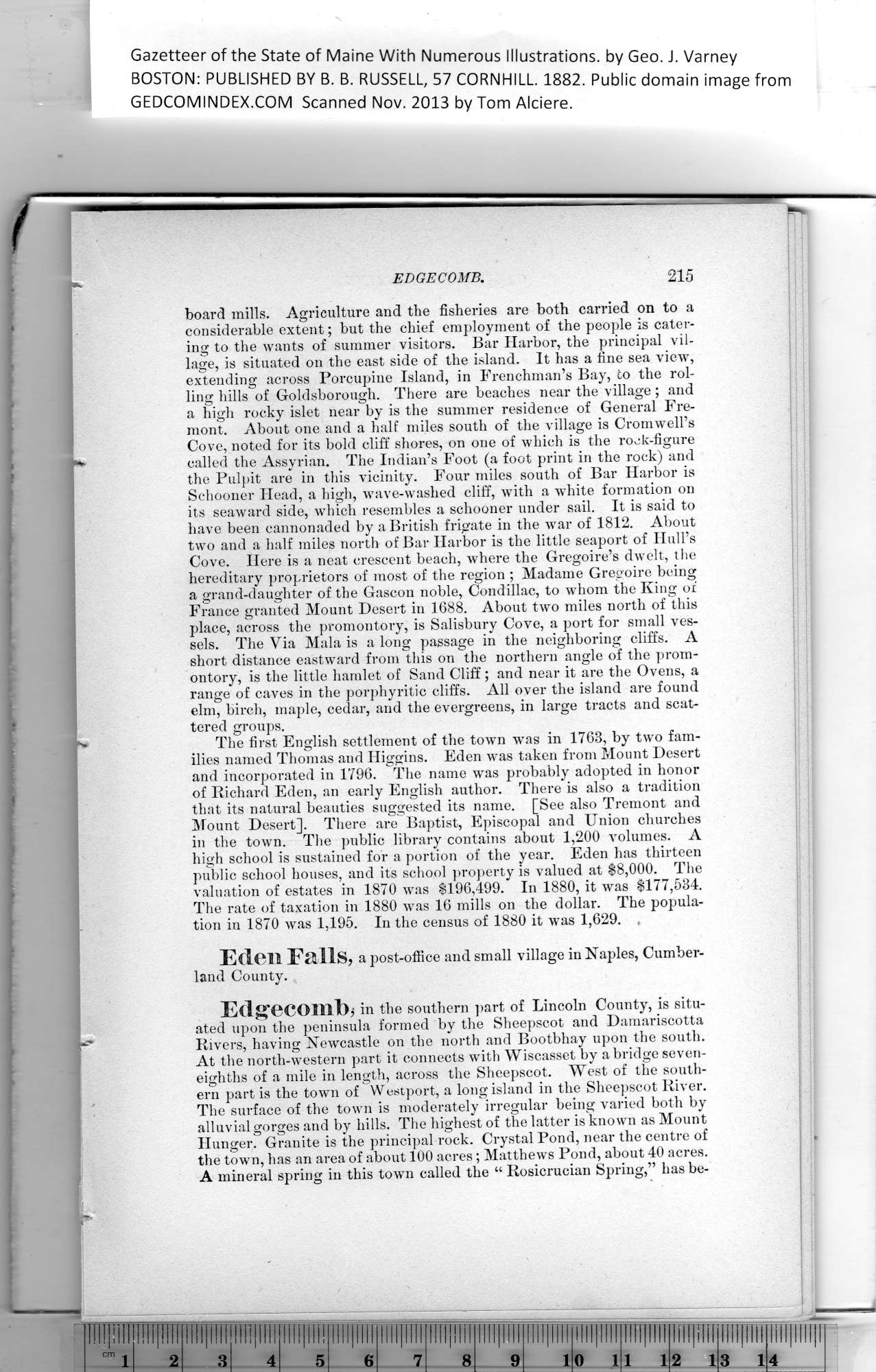|
Gazetteer of the State of Maine With Numerous Illustrations, by Geo. J. Varney
BOSTON. PUBLISHED BY B. B. RUSSELL, 57 CORNHILL. 1882. Public domain image from
board mills. Agriculture and the fisheries are both carried on to a
considerable extent; but the chief employment of the people is cater-
ing to the wants of summer visitors. Bar Harbor, the principal vil-
lage, is situated on the east side of the island. It has a fine sea view,
extending across Porcupine Island, in Frenchman’s Bay, to the rol-
ling hills of Goldsborough. There are beaches near the village; and
a high rocky islet near by is the summer residence of General Fre-
mont. About one and a half miles south of the village is Cromwell’s
Cove, noted for its bold cliff shores, on one of which is the roek-figure
called the Assyrian. The Indian’s Foot (a foot print in the rock) and
the Pulpit are in this vicinity. Four miles south of Bar Harbor is
Schooner Head, a high, wave-washed cliff, with a white formation on
its seaward side, which resembles a schooner under sail. It is said to
have been cannonaded by a British frigate in the wrar of 1812. About
two and a half miles north of Bar Harbor is the little seaport of Hull’s
Cove. Here is a neat crescent beach, where the Gregoire’s dwelt, the
hereditary proprietors of most of the region ; Madame Gregoire being
a grand-daughter of the Gascon noble, Condillac, to whom the King of
France granted Mount Desert in 1688. About two miles north of this
place, across the promontory, is Salisbury Cove, a port for small ves-
sels. The Via Mala is a long passage in the neighboring cliffs. A
short distance eastward from this on the northern angle of the prom-
ontory, is the little hamlet of Sand Cliff; and near it are the Ovens, a
range of caves in the porphyritic cliffs. All over the island are found
elm, birch, maple, cedar, and the evergreens, in large tracts and scat-
tered groups.
The first English settlement of the town was in 1763, by two fam-
ilies named Thomas and Higgins. Eden was taken from Mount Desert
and incorporated in 1796. The name was probably adopted in honor
of Richard Eden, an early English author. There is also a tradition
that its natural beauties suggested its name. [See also Tremont and
Mount Desert], There are Baptist, Episcopal and Union churches
in the town. The public library contains about 1,200 volumes. A
high school is sustained for a portion of the year. Eden has thirteen
public school houses, and its school property is valued at $8,000. The
valuation of estates in 1870 was $196,499. In 1880, it was $177,534.
The rate of taxation in 1880 was 16 mills on the dollar. The popula-
tion in 1870 was 1,195. In the census of 1880 it was 1,629. .
Eden Fnlls, a post-office and small village in Naples, Cumber-
land County.
Edg*eCOmbj in the southern part of Lincoln County, is situ-
ated upon the peninsula formed by the Sheepscot and Damariscotta
Rivers, having Newcastle on tbe north and Bootbhay upon the south.
At tbe north-western part it connects with Wiscasset by abridge seven-
eighths of a mile in length, across the Sheepscot. West of the south-
ern part is the town of Westport, a long island in the Sheepscot River.
The surface of the town is moderately irregular being varied both by
alluvial gorges and by hills. The highest of the latter is known as Mount
Hunger. Granite is the principal rock. Crystal Pond, near the centre of
the town, has an area of about 100 acres; Matthews Pond, about 40 acres.
A mineral spring in this town called tbe “ Rosicrucian Spring,” has be-
PREVIOUS PAGE ... NEXT PAGE
This page was written in HTML using a program written in Python 3.2
|
